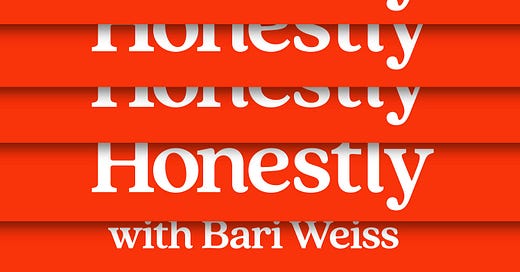Nellie Bowles wasn’t always the TGIF queen you know and love at The Free Press.
In fact, Nellie was, for a very long time, deeply embedded in the progressive left.
Before Bari and Nellie met—and fell in love, blah blah blah—in 2019, Nellie was nothing short of a media darling. She had the right ideas, she wrote the right stories, and NYT readers ate it up.
But Nellie is a reporter. And being a reporter—a great one—forced her to confront the gap between what an increasingly zealous left claimed were its aims. . . and the actual realities of their policies.
People don’t usually change their minds. At least not on big-stakes political issues, and not when their jobs are at risk, or their social acceptance is on the line. And people certainly don’t change their minds publicly.
Nellie did. And she chronicles that change in her new book, Morning After the Revolution: Dispatches from the Wrong Side of History.
The book is a collection of stories from her reporting during the years she started to question the narrative. These were stories people told her not to write. People said, Don’t go to Seattle’s autonomous zone; there’s nothing to see there. They said, Don’t report on the consequences of hormone therapy for kids; it’s not important.
But as Nellie writes, “I became a reporter because I didn't trust authority figures. . . . As a reporter, I spent over a decade working to follow that curiosity. It was hard to suddenly turn that off. It was hard to constantly censor what I was seeing, to close one eye and try very hard not to notice anything inconvenient, especially when there was so much to see.”
That curiosity is what got Nellie kicked out of the club. But it gave her a place in a new club, the one that we at The Free Press think that the majority of Americans are actually in.
On today’s episode: What does it mean to walk away from a movement that was once central to your identity? How does it feel to be accused of being “red-pilled” by the people you once called friends? How did the left become so radical and dogmatic? Why do people join mobs? And how did Nellie come back from the brink?
Learn more about your ad choices. Visit megaphone.fm/adchoices




Odd thing, I stoped by Barnes & Noble last night (June 30) to pick up "Morning After the Revolution: Dispatches from the Wrong Side of History" and after many minutes browsing the shelves of the new etc... I finally asked where I could find it. I was informed "We don't carry that in this store (Burbank CA) but they have 1 at the Grove (16 miles away in WeHo) But I can order it for you and call when it arrives." In that day's of Amazon I am ordering a book at a bookstore and then returning to said bookstore to pick it up several days later? Seems odd to me.
Follow the money. I don’t think Nellie has “changed her mind” or evolved on much of any of her thinking. Her TGIF column doesn’t exhibit much evolvement. She wants to sell books and make money……and retain her seat at the elitist Cool Kids Club. Sorry…..hard pass